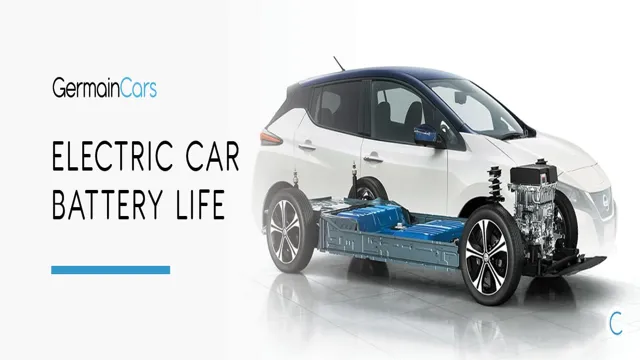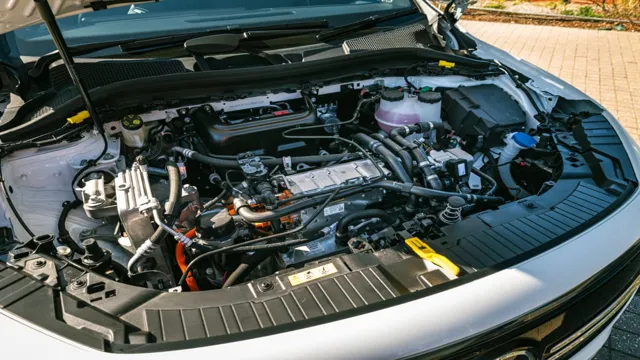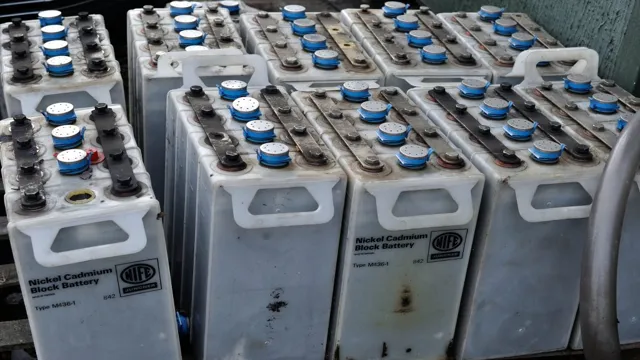Rev Up Your Ride: Unveiling the Truth About Electric Car Battery Life Expectancy
Electric cars have become increasingly popular in recent years as people become more conscious about the environment and the impact of their daily activities on it. However, one of the biggest concerns that potential electric car buyers have is the battery life. How long can an electric car battery actually last? Electric car batteries are designed to last for many years, with most manufacturers offering a warranty of up to eight years or 100,000 miles.
However, the lifespan of a battery can vary depending on a number of factors such as usage, maintenance, and climate. Like any other type of battery, the more you use it, the faster it will degrade. In addition to this, extreme temperatures can also have a significant impact on the lifespan of an electric car battery.
For example, leaving your car parked in the full sun during the summer months can cause the battery to degrade faster than if it was parked in a cooler, shaded area. Maintenance is also an important factor in the longevity of an electric car battery. Regularly charging and discharging the battery can help to prolong its lifespan, as well as keeping the battery clean and free from debris.
So, how long can an electric car battery actually last? Well, it all depends on how it is used and maintained. With proper care and maintenance, an electric car battery can last for many years, providing a reliable and sustainable source of energy for your vehicle.
Introduction
Electric car battery life last is a frequent concern for those considering the purchase of an electric vehicle. The battery life is critical as it affects the car’s performance and efficiency. A battery’s life expectancy varies depending on several factors, including charging habits, driving conditions, and battery capacity.
On average, electric car batteries can last from five to ten years, and manufacturers typically offer warranties of eight years or 100,000 miles. While there are some concerns about battery degradation, studies have suggested that the battery life is longer than expected. Regular maintenance, such as charging the battery to an appropriate level and avoiding extreme temperatures, can help prolong its lifespan.
With advancements in battery technology, we can expect to see even more extended battery life in the future, making electric cars a viable alternative for transportation.
Explaining Electric Car Battery Life Expectancy
Electric car battery life expectancy is a topic that many people are curious about as the demand for electric vehicles continues to grow. It’s understandable to question how long these batteries will last and what kind of maintenance they require since they are a significant investment. The battery is one of the most crucial components in an electric car, as it powers the motor and ensures that the car runs smoothly.
In this blog post, we’ll explain the factors that affect battery life and what you can do to extend its lifespan, so you can get the most out of your electric vehicle. So, let’s dive in and explore the ins and outs of electric car battery life expectancy.

Factors That Affect Battery Life
It’s a common frustration among smartphone users – subpar battery life. But what factors impact how long your battery lasts? Well, there are a number of things that can affect battery life, from the age of your device to the apps you’re using. One primary factor is the capacity of your battery – the bigger the battery, the longer it will last.
Beyond that, things like screen brightness, Wi-Fi or Bluetooth usage, and heat can all take a toll on your battery. In terms of software, the apps you’re running, and whether or not you close them when you’re finished, can make a big difference. So if you’re looking to make your battery last longer, it’s worth taking a look at these various factors and experimenting with different settings to optimize your phone’s power use.
Current Electric Car Battery Life Data
Electric car battery life is a topic that concerns many people who are considering switching from conventional gas-powered vehicles to electric ones. Currently, the average electric car battery life lasts from 100,000 to 200,000 miles, depending on the battery type, use, and maintenance. However, some electric vehicles can last up to 300,000 miles or more, highlighting the potential for long-term sustainability.
Many factors affect battery life, including the depth of discharge, temperature, and charging habits. It is essential to keep these in mind to maximize the lifespan of an electric car battery. While the technology is continually improving, there is still room for further advancement.
Therefore, as electric cars become increasingly mainstream, so too will developments in battery technology, meaning that electric cars will only become more durable and long-lasting. Ultimately, switching to electric vehicles is not only good for the environment, but it is also a smart investment in the long run.
Comparing Popular Electric Car Models
Electric Car Battery Life When it comes to electric cars, one of the major concerns for prospective buyers is the battery life. After all, the battery is what powers the car and determines how far you can go on a single charge. Luckily, the current crop of electric cars on the market boasts impressive battery life.
For instance, the Tesla Model S has a battery range of up to 402 miles on a single charge, while the Nissan Leaf can go up to 226 miles. The Chevrolet Bolt has a range of up to 259 miles, and the Ford Mustang Mach-E has a range of up to 300 miles. These numbers have been improving steadily over the years as technology evolves, and it looks like they will continue to improve.
It’s worth noting that the actual range you can achieve on a single charge can vary depending on factors such as weather, driving habits, and the terrain you are driving on. Nonetheless, it’s clear that electric cars are now a viable option for those who want to travel long distances without having to worry about running out of juice.
Real-World Battery Life Usage Examples
When it comes to electric cars, one of the major concerns for prospective buyers is battery life. Luckily, recent data suggests that the battery life of electric cars has been steadily improving over the years. For example, the Chevrolet Bolt is estimated to have a range of 259 miles on a full charge, while the Tesla Model S can go up to 390 miles.
These real-world usage examples suggest that the range of electric cars is slowly but surely catching up with traditional gas-powered cars. Of course, the actual range you get will depend on a variety of factors such as temperature, driving habits, and terrain. Nonetheless, the data is promising and will likely continue to improve as technology advances.
So, if you’re considering buying an electric car but are worried about battery life, do some research and look at the specific models available to determine whether they meet your needs.
Battery Warranty Information
electric car battery warranty, battery life data Electric car battery warranties can vary depending on the manufacturer and model, but most offer warranties up to 8 years or 100,000 miles, whichever comes first. However, with advancements in battery technology and longer-term data collection, we are seeing that electric car batteries are lasting much longer than previously expected. Studies have shown that the average electric car battery degradation rate is only around
3% per year, meaning that after 10 years, the battery may still retain up to 80% of its original capacity. This is an impressive statistic when compared to traditional gas-powered cars, which typically need major engine repairs by that point in their life. Overall, electric car battery life data is encouraging and provides more confidence in the longevity of electric vehicles.
How to Extend Your Electric Car Battery Life
Electric car battery life lasts for several years, but with proper care, it can last even longer. One way to extend your electric car battery life is to avoid letting it fully discharge before charging it again. It’s best to keep the battery charged between 20-80% capacity.
Regular maintenance, such as checking the fluid levels and replacing old parts, can also help prolong the battery’s life. Another tip is to avoid exposing the battery to extreme temperatures and to park your car in a shade or garage when possible. Additionally, installing a battery management system (BMS) can help monitor and regulate the battery’s temperature and voltage, which can also extend its life.
By following these tips, you can help ensure that your electric car battery lasts longer and saves you money in the long run.
Maximizing Battery Life Tips and Tricks
Driving an electric car has numerous benefits, such as reducing your carbon footprint and saving money on fuel costs. However, one primary concern for EV owners is how to extend the battery life of their vehicle as much as possible. To maximize your electric car battery life, there are several tips and tricks you can follow.
Firstly, avoid charging your battery to its full capacity regularly. Instead, charge it to about 80% or 90% to keep the battery healthy. Also, try to avoid exposing your car to extreme temperatures, such as leaving it parked in the sun for long periods or exposing it to freezing conditions.
Use the regenerative braking feature commonly available in electric cars, which charges the battery every time you brake and slows the car down, saving wear on brakes. Finally, remember to keep up with routine maintenance like tire rotations, regular oil changes, and scheduled EV battery check-ups. By following these simple tricks, you can extend the battery life of your electric vehicle, saving you money and making it an environmentally-friendly choice for years to come.
Battery Maintenance and Care
When it comes to electric car battery maintenance and care, there are a few things you can do to extend the life of your battery. First and foremost, make sure to always keep your battery charged between 20% and 80% of its capacity. This will prevent overcharging or undercharging, which can damage the battery cells and shorten their lifespan.
Additionally, try to avoid exposing your battery to extreme temperatures for extended periods of time, as this can also be detrimental to its health. Finally, use regenerative braking whenever possible, as it helps to recharge the battery while you’re driving. By following these simple tips, you can help ensure that your electric car battery lasts for years to come.
Conclusion
Electric car battery life may seem fleeting, but fear not – it’s not like a Hollywood marriage. With proper maintenance, charging habits, and advancements in technology, electric car batteries can last for years to come. So go ahead and take that road trip, or commute to work with ease, knowing that your electric vehicle’s battery life will keep up with you every step of the way.
“
FAQs
How long does an electric car battery last?
The lifespan of an electric car battery varies depending on factors such as usage, weather, and maintenance practices. However, on average, an electric car battery should last between 8 to 10 years.
How can I extend the battery life of my electric car?
To extend the battery life of your electric car, you should avoid frequently charging your battery to 100%, avoid extreme temperatures, and regularly maintain your car’s battery.
What should I do if my electric car battery dies?
If your electric car battery dies, you should contact your car manufacturer or dealer to discuss repair or replacement options, depending on the warranty status of your battery.
Can an electric car battery be recycled?
Yes, most components of an electric car battery can be recycled, including the metals, plastics, and electrolytes. Many car manufacturers have recycling programs in place to facilitate proper disposal and reuse of electric car batteries.







